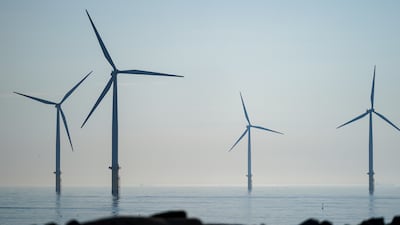Britain on Wednesday offered about $2 billion to lure new investment in offshore wind and clean energy.
Ministers hope the record sum will “attract cutting-edge clean technologies to Britain” in an auction of renewable energy contracts this summer.
Investors failed to put in a single bid for offshore wind projects in the last auction last year, damaging the UK's clean energy plans.
The pot available for offshore wind has been increased to £1.1 billion ($1.41 billion) as the new Labour government makes home-grown energy a flagship policy.
“Last year’s auction round was a catastrophe, with zero offshore wind secured, and delaying our move away from expensive fossil fuels to energy independence,” Energy Secretary Ed Miliband said.
“Instead, we are backing industry to build in Britain, with this year’s auction getting its biggest budget yet,” he said.
The total auction budget of £1.5 billion ($1.92 billion) is about 50 per cent larger than the amount proposed by the previous Conservative government.
It includes funding for solar farms, tidal power and onshore wind, for which building rules have been relaxed by Mr Miliband.
Bidders who win a clean energy project are given a guaranteed electricity price, with consumers making up the difference if necessary or reimbursed if costs are higher.
Britain is looking to the private sector to help fund its clean power push even as a new state-owned company, Great British Energy, provides some investment.
Owners of operational wind farms in Britain include the UAE's Masdar, Denmark's Orsted and Germany's RWE.

Sticking plaster
Jonny Marshall, an economist at the Resolution Foundation think tank, said the higher budget was a “necessary sticking plaster” after last year's failure.
He said costs were rising for developers due to high interest rates and supply chain problems, even as the technology improves.
Last week, Labour announced plans to build more wind turbines on the seabed owned by King Charles III as it aims for a clean power grid by 2030.
Making Britain a 'clean energy superpower' is one of what Prime Minister Keir Starmer calls his five 'missions' in government.
To meet this goal, the “vast majority” of new offshore wind will have to be agreed in this year's and next year's auctions, Energy UK chief executive Emma Pinchbeck said.
“That remains a huge challenge but [the higher budget] is certainly a big step in the right direction and another welcome demonstration of the government’s ambitions,” she said.
Annual figures released on Tuesday showed a record 46.4 per cent of Britain's electricity came from renewable sources in 2023.
Wind turbines provided 28.1 per cent, also a record, while coal fell to a new low of 1.3 per cent, with only one coal-fired power station remaining operational.
However, the UK returned to being a net electricity importer after an unusual year in 2022 in which France had to buy electricity from Britain due to problems with its nuclear reactors.
Britain's nuclear reactor fleet suffered issues last year, contributing to a drop in generation after two plants closed in 2022.
A separate set of figures showed the EU's wind and solar production overtaking fossil fuel generation for the first time, in the first half of 2024.
Fossil fuels generated 17 per cent less than in the same period last year, even as demand rebounded, according to energy think tank Ember.


